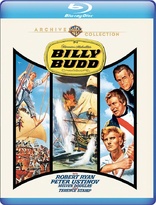Billy Budd Blu-ray Movie
HomeBilly Budd Blu-ray Movie 
Warner Bros. | 1962 | 123 min | Not rated | Jul 10, 2018Movie rating
7.4 | / 10 |
Blu-ray rating
| Users | 0.0 | |
| Reviewer | 3.5 | |
| Overall | 3.5 |
Overview
Billy Budd (1962)
It's 1797, and the English frigate Avenger sails wartime seas, ready to engage the French navy in the broadside-for-broadside of combat. But there's another warfare going on, a conflict aboard the king's ship. It's the battle of good versus evil, fought between the young Billy, an archetype of goodness, and the ship's the master-at-arms, who is efficient and cruel - especially to young Billy. Based on the novel by Herman Melville.
Starring: Robert Ryan (I), Peter Ustinov, Melvyn Douglas, Terence Stamp, John NevilleDirector: Peter Ustinov
| Drama | Uncertain |
| Adventure | Uncertain |
Specifications
Video
Video codec: MPEG-4 AVC
Video resolution: 1080p
Aspect ratio: 2.40:1
Original aspect ratio: 2.35:1
Audio
English: DTS-HD Master Audio 2.0 Mono (48kHz, 24-bit)
Subtitles
English SDH
Discs
Blu-ray Disc
Single disc (1 BD)
Playback
Region A, B (C untested)
Review
Rating summary
| Movie | 3.0 | |
| Video | 4.5 | |
| Audio | 4.0 | |
| Extras | 3.5 | |
| Overall | 3.5 |
Billy Budd Blu-ray Movie Review
The Innocent
Reviewed by Michael Reuben July 18, 2018Terence Stamp has enjoyed a long and varied acting career, and depending on your taste in films,
you will know him for different kinds of roles. For some, he will always be the original General
Zod to Christopher Reeves's Superman. For others, he remains the
feckless Chancellor Valorum
in The Phantom Menace or the
mysterious armorer, Pekwarsky, in Wanted. For the more
classically inclined, he is the handsome and heartless Sgt. Troy in the 1967 version of Far from
the Madding Crowd or the politely terrifying stalker in The Collector or the rakish Willie Garvin
in Modesty Blaise. For Eighties fanatics, he's the
corporate raider, Sir Larry Wildman, in Wall
Street, and the alien crime boss, Harcourt, in Alien
Nation. For the arthouse crowd, he's the vengeful English hoodlum, Wilson, in Steven Soderbergh's The Limey
(still criminally absent on
Blu-ray).
But the first time Stamp set foot on a movie set was as the title character in Billy Budd, a prestige
passion production co-starring and produced, directed and co-written by British acting legend
Peter Ustinov. Ustinov gambled on Stamp to embody the angelic naif around whom author
Herman Melville constructed his final, enigmatic novel—a character so unlikely in his radiant
good nature that he seems too good to be true. But the director's instinct was rewarded with one
of Stamp's most memorable performances, the only one for which the actor has ever received an
Oscar nomination. (It was for Best Supporting Actor, though he played the title character;
even back then, producers tried to game the system by manipulating categories; as Best Actor,
Stamp would have been up against sure-fire winner Gregory Peck for To Kill a Mockingbird.)
Melville's Billy Budd was published after the author's death, reconstructed by his wife from
drafts and notes, then later re-reconstructed by scholars. It began as poetry, which is what
Melville had been writing for thirty years after his last "official" novel, The Confidence-Man. It
used to be popular in high school English classes—for all I know, it still is—primarily because it
was short but also because its characters are so broadly drawn. The characters are archetypes,
lacking the density and ambiguity of Melville's earlier work, and the story is a simple one with a
clear dramatic arc. It's not surprising that it was adapted into a successful stage play, which was
then further adapted into an opera by composer Benjamin Britten. Ustinov's film is also based on
the play.
Although Warner Brothers was not involved in the original production of Billy Budd, the film is
now part of its library. A DVD was released in 2007 and reissued by the Warner Archive
Collection after it went out of print. The continued popularity of the film on DVD persuaded
WAC to undertake a Blu-ray remaster, which ably showcases the film's beautiful widescreen black-and-white photography by Robert Krasker,
the Oscar-winning cinematographer of The Third
Man.
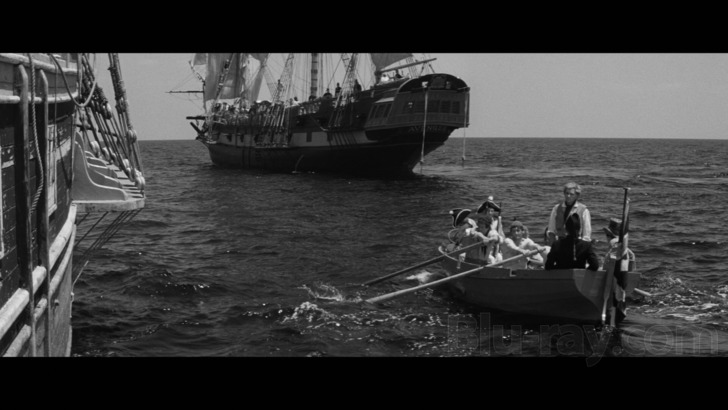
Billy Budd is set in 1797 during a period of war between Britain and France. Most of the action occurs aboard a British frigate, the ironically named HMS Avenger, which is commanded by Captain Vere (Ustinov). The specter of mutiny haunts the Avenger, as it does every warship in Britain's fleet. The crews are filled with malcontents, a product both of poor conditions and of the prevailing techniques for staffing the British Navy, which consisted of randomly pressing men into service, both on land and at sea. In the film's opening, the Avenger boards a British commercial vessel named The Rights of Man and commandeers a young sailor, Billy Budd (Stamp). An indefatigable optimist, Billy cheerfully accepts his fate, accompanying his captors to his new berth aboard the Avenger and waving at his former shipmates while he calls out: "Goodbye to you, too, old Rights of Man!" (The line comes directly from Melville, where it's less of a groaner, because it follows a description of how the ship's owner, though British, gave his vessel the name of Thomas Paine's pamphlet in support of U.S. independence, of which he was a great admirer.)
Once Billy boards Avenger, the film falls neatly into three acts. In the first, Billy gets acquainted with the ship and its crew, and they are quickly won over by his innate goodness and boundless generosity. The men are hungry for a dose of uplift in their daily lives, which are ruled by the Avenger's cruel master-at-arms, Mr. Claggart (Robert Ryan, making no attempt to disguise his American accent). Claggart is Billy's polar opposite: suspicious where Billy is trusting, brutal where Billy is kind, and manipulative where Billy is guileless. He is despised by the crew, whom Claggart routinely suspects to be on the verge of mutiny—and ironically, because of Claggart's harsh treatment, they often are.
In the film's second act, Claggart focuses on Billy as his archenemy, not because Billy has committed any offense or evidenced any bad influence. On the contrary, his presence among the crew has a demonstrably calming effect, and he respects the ship's chain of command. But for Claggart, Billy represents an existential threat, because his very nature challenges the dour master-at-arms' Hobbesian world view, in which men are beasts who respond only to fear of the whip. After discovering Billy's weak spot, which is his inability to speak when emotionally distraught, Claggart contrives to provoke the innocent seaman into an offense that, in the charged environment aboard the Avenger, will almost certainly be deemed mutinous. The smile that passes across Ryan's face after he succeeds is a masterpiece. It's not just a reflection of Claggart's pleasure at besting his enemy; it bespeaks profound satisfaction that his bleak assessment of humanity has been vindicated.
In the third act, Billy is tried by the ship's officers, and the trial devolves into an argument between justice, represented by Gunnery Officer Wyatt (David McCallum), and the practical needs of social order, represented by Captain Vere. It is here that one can appreciate why Ustinov wanted to play the captain, as Vere articulates at length the reasons why Billy's actions, however justified, cannot be excused, lest his example incite other sailors to even more serious infractions. The extended trial sequence is the part of the film that feels most stage-bound, even in a film that routinely bears the marks of its initial incarnation as a play, despite six weeks of filming at sea on an actual ship sailing in the Mediterranean.
Ustinov's stature in the entertainment world attracted a sterling cast of mostly British actors, with the addition of a few Americans like Ryan and the reliable Melvyn Douglas, who plays "The Dansker", a sailor with an indeterminate accent who says he's Danish, though his crewmates doubt his word. But it is first-timer Stamp who stands out from the crowd, his chiseled features and infectious smile lending Billy a weight and credibility that are essential to the story's impact. It's not surprising that the role launched an exceptional career, attracting the attention of great directors like William Wyler, John Schlesinger and Federico Fellini (with whom Stamp would make Spirits of the Dead). In its totality as a film, Billy Budd may feel stagey and dated, but Stamp's performance as the man to whom Melville routinely referred as "the Handsome Sailor" remains just as glowing as when it was new.
Billy Budd Blu-ray Movie, Video Quality 
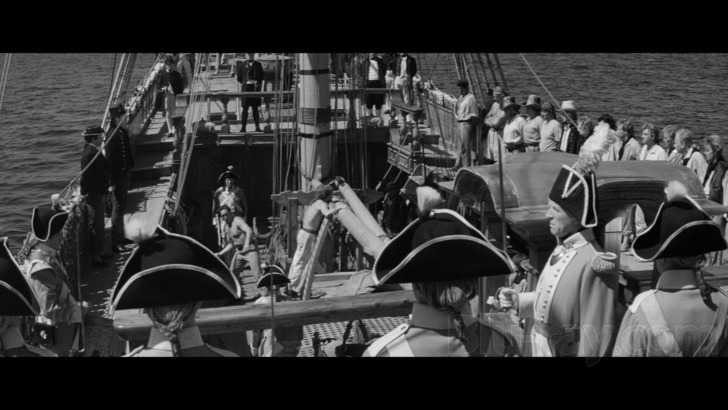
As noted in the introduction, Billy Budd was shot by Robert Krasker, whose atmospheric black-and-white imagery for The Third Man had already won him an Oscar. Now shooting in
CinemaScope, Krasker had to overcome multiple challenges, from shooting on water to
illuminating the cramped spaces of the Avenger's interiors (built on a soundstage) where much of
the film's drama plays out, both among the men below deck and during the third-act "trial". For
this 1080p, AVC-encoded Blu-ray from the Warner Archive Collection, a fine-grain master
positive made directly from the camera negative was scanned at 2K by Warner's MPI facility.
Although the camera negative has been well-preserved and the fine-grain was of recent vintage,
there were still over 1000 instances of dirt, scratches and age-related damage that had to be
cleaned up, after MPI had completed its color-correction, which used a well-preserved print of
the film as a reference.
The Blu-ray image is beautifully sharp and detailed, capturing minutia of the Avenger's intricate rigging
and the crew's weathered faces and motley attire even in long shots. The blacks are deep and
solid, and the finely delineated shades of gray render the environment with an impressive sense
of depth. By this point in its history, CinemaScope's anamorphic distortions had been largely
eliminated by Panavision's superior optics, and there are no such artifacts on display here. Scenes
shot "day for night" have the unavoidable artificiality imparted by that process, but that is no
fault of the Blu-ray. The film's grain pattern is visible but well-resolved and naturally
reproduced. WAC has mastered the film at its usual high average bitrate, here 34.98 Mbps.
Billy Budd Blu-ray Movie, Audio Quality 
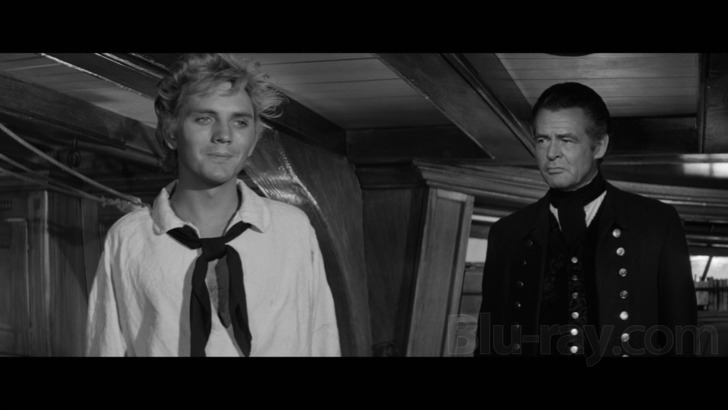
Billy Budd's original mono track has been taken from the magnetic master and encoded as lossless DTS-HD MA 2.0. The track was well-preserved and required minimal cleanup and re-EQ. The dialogue is clearly rendered, along with other essential sonics of 18th Century life at sea, such as wind, waves and the creaking of ropes, sails and wooden hulls—and also the crack of a whip meeting flesh, which is one of Claggart's favorite sounds. Dynamic range is acceptable for the period, with sufficient bass extension to make cannon fire authoritative. The stirringly operatic score by British composer Antony Hopkins (that's "Antony", without the "h") (Cast a Dark Shadow) is faithfully reproduced.
Billy Budd Blu-ray Movie, Special Features and Extras 
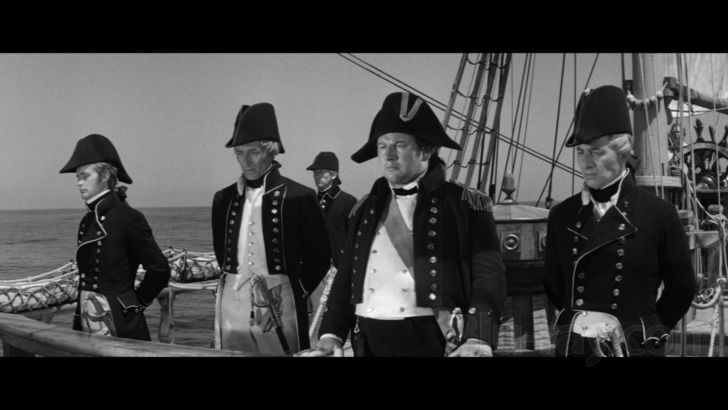
The extras have been ported over from Warner's 2007 DVD of Billy Budd.
- Commentary with Actor Terence Stamp and Filmmaker Steven Soderbergh: Soderbergh directed Stamp in The Limey (one of the director's best films), and here he serves primarily as an interviewer, prompting Billy Budd's star with questions about the making of the film, the people he worked with, and his long and colorful career. Stamp's recall is remarkable and his stories are vivid, recounting a life that included rooming with Michael Caine as young and penniless actors, being directed by Ustinov, Wyler and Fellini, and acting opposite partners as varied as Robert Ryan, Samantha Eggar and Marlon Brando. The track is essential listening for any admirer of the actor's work.
- Trailer (1080p; 2.35:1; 3:01).
Billy Budd Blu-ray Movie, Overall Score and Recommendation 
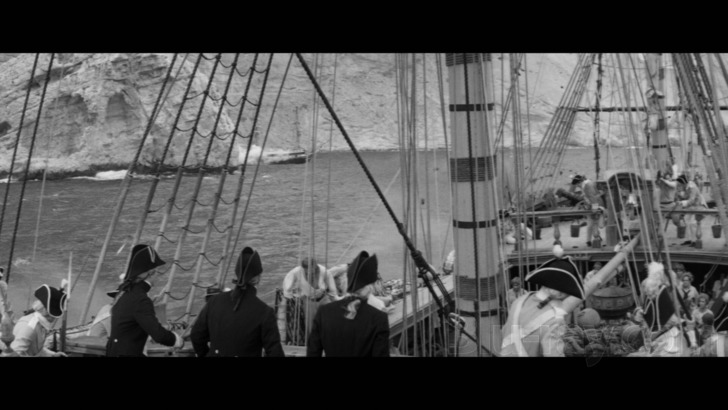
Billy Budd is talky and slow-paced for modern tastes, and its allegorical underpinnings can be
hard to swallow, as they often are in Melville's novel. But the performances remain fresh and
convincing, especially Robert Ryan's implacable Claggart and Terence Stamp's Billy, the
Handsome Sailor to whom everyone except Claggart takes an instant liking. WAC has given the
film its usual superior treatment, which is highly recommended.
Similar titles
Similar titles you might also like

Passage to Marseille
Warner Archive Collection
1944

Outcast of the Islands
1951

The Sea Wolf
1941

Captains Courageous
1937

Against All Flags
1952

Mudbound
2017

Moby Dick
1956

Ruby Gentry
1952

Cinderella Liberty
Limited Edition to 3000
1973

Underwater!
Warner Archive Collection
1955

The Iron Mask
1929

Fantastic Voyage
Fox Studio Classics
1966

Cause for Alarm!
1951

Journey Into Fear
Warner Archive Collection
1943

Patterns
2K Restoration
1956

The Killing of Sister George
1968

Home from the Hill
1960

The Court-Martial of Billy Mitchell
One Man Mutiny | Special Edition
1955

The Sea Hawk
Warner Archive Collection
1940

Four Frightened People
1934
